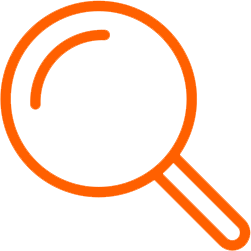As an informed and responsible borrower, you should make sure to find out in advance how much mortgage you may qualify for when planning to purchase real estate on credit. By seeking pre-approval and coming up with an estimate beforehand about the amount of money that could be approved in principle to finance your new home purchase, you are essentially defining your budget by narrowing your options based on your affordability. We firmly insist that you should spend some time exploring your choices below for purchase loans even before you begin the quest of finding the house of your dreams.
NMLS # : 1969890
Loan Options
Become a Proud Homeowner by Choice and Not by Chance with Our Mortgages
Conventional
 Being precisely what their name suggests, conventional mortgages remain the most popular type of home loan since their introduction, and they happen to be the only option for a significant majority of prospective American homebuyers. Conventional loans are capped at $647,200 and they require a 5% down payment, essentially translating to one-twentieth of the purchase price of the property under consideration, which the borrower must finance.
Being precisely what their name suggests, conventional mortgages remain the most popular type of home loan since their introduction, and they happen to be the only option for a significant majority of prospective American homebuyers. Conventional loans are capped at $647,200 and they require a 5% down payment, essentially translating to one-twentieth of the purchase price of the property under consideration, which the borrower must finance.
Furthermore, although the private mortgage insurance or PMI must be greater than 80% of your loan-to-value or LTV) ratio, seller concessions are often available and tend to vary from 3% to 9% of the sales price. To put it simply, LTV is the ratio of the amount of money (that you have borrowed from a home loan provider) to the purchase price of your house, and this number should be less than your PMI.
In sharp contrast to other home loans, such as FHA loans, conventional mortgages are not inclusive of program-specific costs. They are highly flexible and you may opt for a variable- or fixed-rate loan with any loan tenure of your choice, for instance, 30, 20, 15 years, etc. You may also purchase an investment property or your second home with a conventional mortgage.
Conventional loans are best suited to individuals with a credit score of 620 or higher and borrowers with a 740+ score are most likely to obtain the best possible rate. You are also required to provide a 3% down payment when opting for a conventional mortgage. The terms and conditions of these loans are stipulated by the Federal Housing Finance Agency or FHFA, and in general, the income criteria and down payment requirement for conventional mortgages are governed by Freddie Mac and Fannie Mae.
FHA Loans
 An FHA Loan is a kind of home loan that is insured by the Federal Housing Administration. FHA mortgages are capped at $420,680 and although they do not have any income requirements, borrowers are accountable to pay for the 3.5% down payment, i.e., $35 for every $1,000 they have borrowed to purchase a property.
An FHA Loan is a kind of home loan that is insured by the Federal Housing Administration. FHA mortgages are capped at $420,680 and although they do not have any income requirements, borrowers are accountable to pay for the 3.5% down payment, i.e., $35 for every $1,000 they have borrowed to purchase a property.
An FHA mortgage also comprises seller concessions of up to 6% of the property sales price and a one-time cost to insure your home loan. Since the FHA itself acts as the insurer for the mortgages it offers, lenders are provided with an additional degree of safety and they are more willing to offer better terms and lower rates to anyone who may not have met the borrower eligibility criteria otherwise.
You may secure an FHA loan to refinance an existing mortgage or purchase a condominium, prefabricated house, multifamily residence, or single-family home. It may also be leveraged when planning new construction or home improvement. However, your monthly debt should be equal to or less than half of your income before tax with an FHA mortgage, which means your debt-to-income ratio must not be more than 50% for any given month.
FHA loans are immensely popular amongst first-time homebuyers and those who may not have just enough savings to purchase the house of their dreams or are currently experiencing some credit-related issues. However, when applying for this loan to buy a condominium, you should make sure beforehand that it is indeed included in the list of properties authorized by the FHA.
Individuals with a credit score of 580+ can certainly expect to secure an FHA mortgage without any significant hassles, but those in the range of 500 to 579 may qualify too as long as they can afford a larger down payment. Furthermore, borrowers are also permitted to receive any monetary gift with an FHA loan, including financial assistance from charitable organizations, businesses, or family members.
VA Loans

VA loans were first introduced by the Department of Veteran Affairs in 1944 to aid the US veterans once the Second World War ended. Not requiring any down payment and featuring low-interest rates, VA mortgages are an ideal choice for not only those who are currently serving or were employed with the United States Armed Forces or USAF but also their spouses meeting the specified requirements concerning borrower eligibility when planning to refinance an ongoing home loan.
However, all loan applicants must satisfy each of the governing norms of a VA loan, and merely being associated with one of the six divisions of the USAF in any manner or having a spousal relationship with an active or retired service member does not necessarily make an individual eligible to apply for one.
VA loans are capped at $647,200 and the borrowers are not required to pay for mortgage insurance. Except for the disabled veterans, for whom it is waived, one may also ask to have the necessary charges to finance the loan included in his or her VA mortgage.
Interest rates for 30-year VA loans are often less when compared to those of FHA or conventional mortgages. Expenses associated with a VA loan are subject to specific restrictions, for instance, the amount of mortgage approved for disbursal to the borrower should be 100% of its origination cost at the very least.
DSCR Loans
 Debt Service Coverage Ratio loans are for real estate investors who wish to purchase an investment property but are not interested in obtaining a loan based on their tax returns. The DSC ratio is defined as, for any given year, the net operating income or NOI of the property (being considered for acquisition) to the mortgage debt obligation (also referred to as mortgage debt service) concerning the same.
Debt Service Coverage Ratio loans are for real estate investors who wish to purchase an investment property but are not interested in obtaining a loan based on their tax returns. The DSC ratio is defined as, for any given year, the net operating income or NOI of the property (being considered for acquisition) to the mortgage debt obligation (also referred to as mortgage debt service) concerning the same.
It is often evaluated by lenders to ascertain whether the applicant may be considered for a property loan or not as the DSC ratio of a prospective borrower is a direct measure of his or her ability to repay the debt that one owns. When it comes to DSCR loans, the capability of a person to pay off a mortgage is also known as the income coverage of that particular individual.
A DSCR loan is easier to secure since several property investors often mark down a significant sum of money that they have spent on their rental properties. Furthermore, there is simply no restriction on the number of homes that may be financed with DSCR loans, which is certainly not the case for bankable mortgages, such as the ones provided by Fannie Mae and Freddie Mac.
To suffice, the DSC ratio is a statistical estimate to assess the likelihood of a prospective borrower being able to settle the debt owed if he or she were to secure a mortgage from the lender, and it is computed after taking the potential rental income into due consideration. You may also apply for a DSCR loan as a business entity like a limited liability corporation or LLC.
Admittedly, DSCR goes beyond that merely attempting to make an educated guess in advance on how much cash flow the property that you are planning to include in your investment portfolio may yield, but the way it is calculated differs from one lender to another and so do the minimal requirements for borrower eligibility concerning a DSCR loan.
In general, a value of 1.5+ is considered excellent, anything in the range of 1.5 to 1.2 is regarded as satisfactory, and a score of 1.0 means that for any given month, the rent receivables earned by the real estate investor are equal to his or her mortgage repayments.
Bank Statement Loans
 If you happen to be a small business owner, freelancer, independently operating consultant or professional, or have a job that does not guarantee a steady and fixed income, a bank statement loan may prove to be more useful when compared to any conventional mortgage.
If you happen to be a small business owner, freelancer, independently operating consultant or professional, or have a job that does not guarantee a steady and fixed income, a bank statement loan may prove to be more useful when compared to any conventional mortgage.
Also known as a non-qualified mortgage or loan for the self-employed, a bank statement program can often turn out to be an excellent alternative for prospective borrowers without any considerable evidence (for instance, annual tax returns) to substantiate their debt repayment potentiality.
It is an equally wise option for those who do not file their taxes, are entrepreneurs, or have part-time employment. A bank statement loan can also be utilized by those who have left or lost their jobs after purchasing a property.
Mortgages with a ceiling of $5 million may be obtained for owner-occupied houses, secondary residences, or investment real estate. Although tax returns are not required, in addition to having a credit score of 600 or higher and two years of self-employment, you should also submit two years of financial statements of your company or one-year bank statement from a personal savings account
Much contrary to popular notion, a bank statement program may help you secure a home loan rather quickly since the odds of qualifying for one are significantly dependent on your bank statements and you may even be deemed eligible to purchase a larger house on credit than you would with any conventional mortgage.

Apply Online
Learn about the kind of home loans that you may be approved for in no time with us.

Get Preapproved
Find out how much money you are entitled to borrow and start your dream home shopping or refinance an ongoing mortgage.

Check Your Rate
Refer to your to-do list to validate the details that you have provided us to get pre-approved and proceed to close your home loan.


